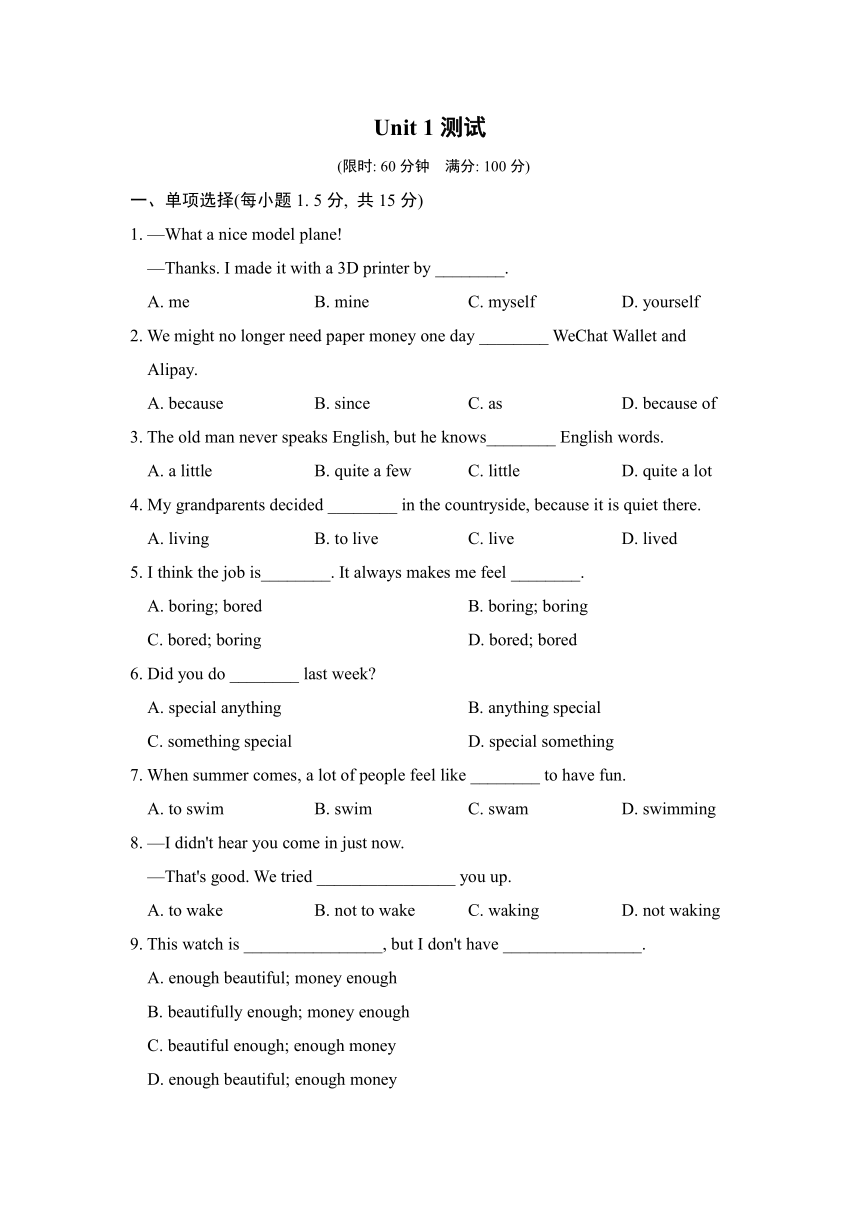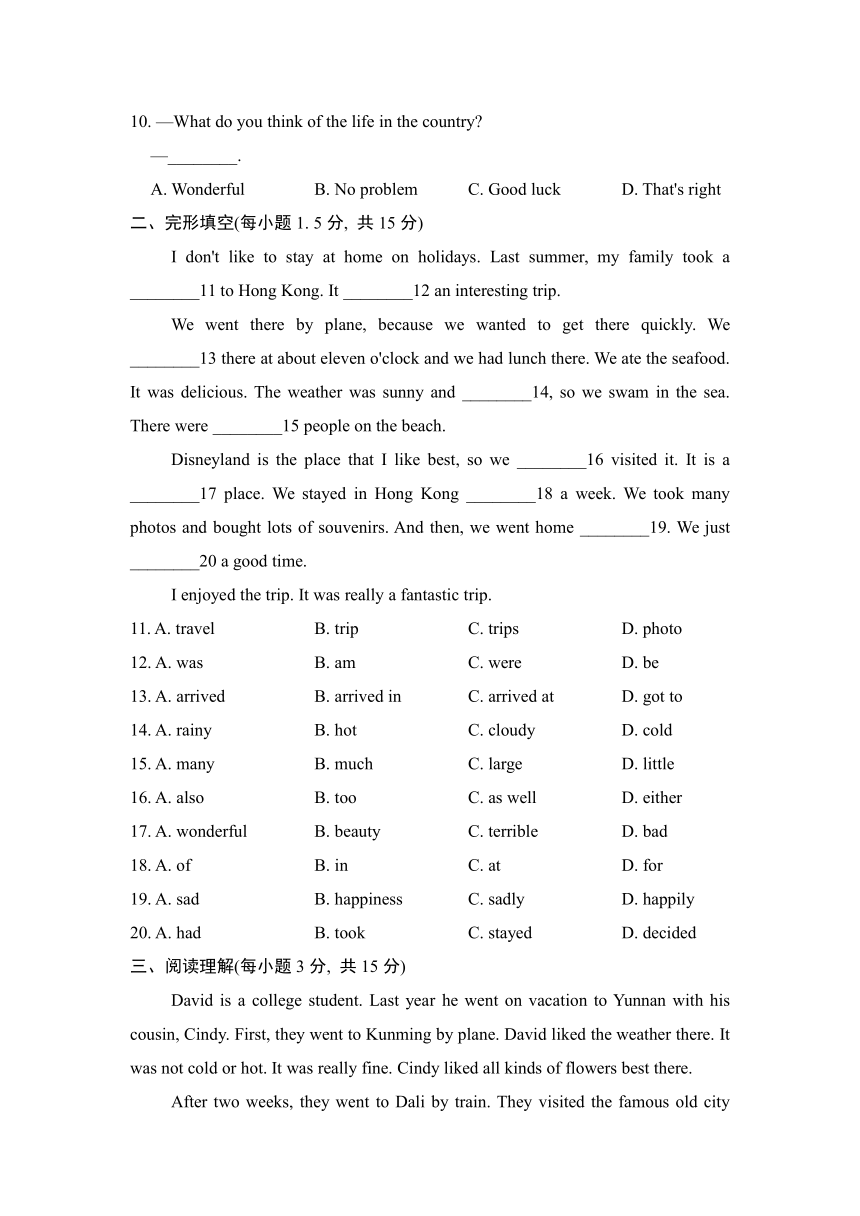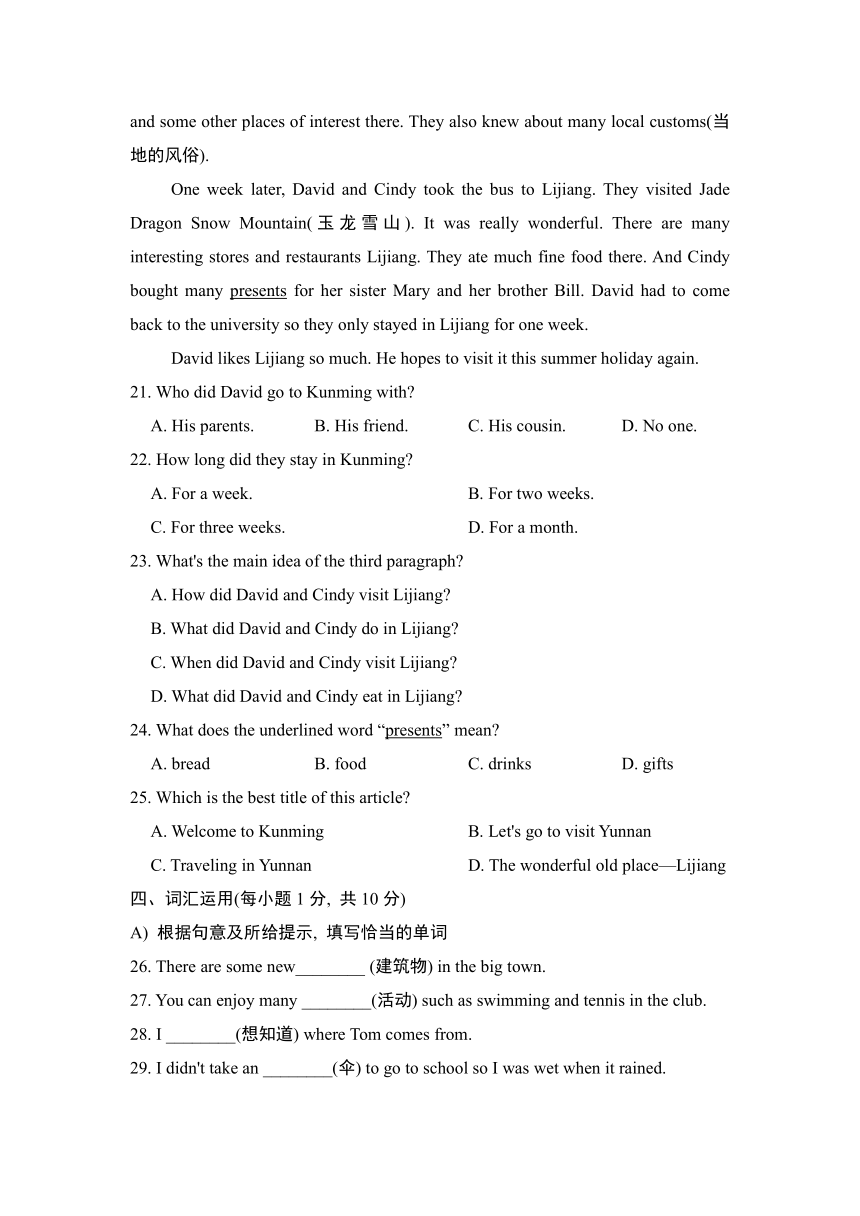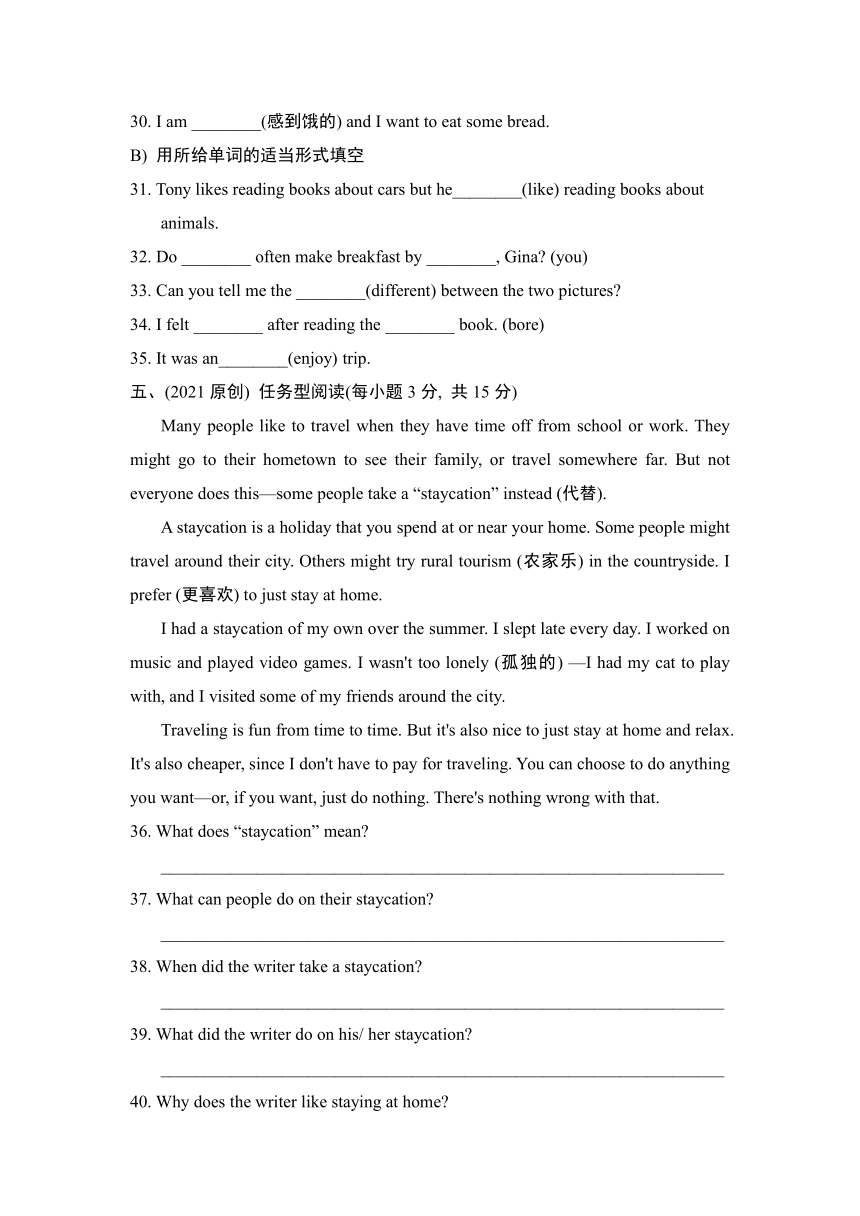Unit 1 Where did you go on vacation 单元测试(含答案)
文档属性
| 名称 | Unit 1 Where did you go on vacation 单元测试(含答案) |  | |
| 格式 | doc | ||
| 文件大小 | 62.0KB | ||
| 资源类型 | 教案 | ||
| 版本资源 | 人教新目标(Go for it)版 | ||
| 科目 | 英语 | ||
| 更新时间 | 2021-05-03 08:12:41 | ||
图片预览




文档简介
Unit 1测试
(限时: 60分钟 满分: 100分)
一、单项选择(每小题1. 5分, 共15分)
1. —What a nice model plane!
—Thanks. I made it with a 3 D printer by ________.
A. me B. mine C. myself D. yourself
2. We might no longer need paper money one day ________ WeChat Wallet and Alipay.
A. because B. since C. as D. because of
3. The old man never speaks English, but he knows________ English words.
A. a little B. quite a few C. little D. quite a lot
4. My grandparents decided ________ in the countryside, because it is quiet there.
A. living B. to live C. live D. lived
5. I think the job is________. It always makes me feel ________.
A. boring; bored B. boring; boring
C. bored; boring D. bored; bored
6. Did you do ________ last week?
A. special anything B. anything special
C. something special D. special something
7. When summer comes, a lot of people feel like ________ to have fun.
A. to swim B. swim C. swam D. swimming
8. —I didn't hear you come in just now.
—That's good. We tried ________________ you up.
A. to wake B. not to wake C. waking D. not waking
9. This watch is ________________, but I don't have ________________.
A. enough beautiful; money enough
B. beautifully enough; money enough
C. beautiful enough; enough money
D. enough beautiful; enough money
10. —What do you think of the life in the country?
—________.
A. Wonderful B. No problem C. Good luck D. That's right
二、完形填空(每小题1. 5分, 共15分)
I don't like to stay at home on holidays. Last summer, my family took a ________11 to Hong Kong. It ________12 an interesting trip.
We went there by plane, because we wanted to get there quickly. We ________13 there at about eleven o'clock and we had lunch there. We ate the seafood. It was delicious. The weather was sunny and ________14, so we swam in the sea. There were ________15 people on the beach.
Disneyland is the place that I like best, so we ________16 visited it. It is a ________17 place. We stayed in Hong Kong ________18 a week. We took many photos and bought lots of souvenirs. And then, we went home ________19. We just ________20 a good time.
I enjoyed the trip. It was really a fantastic trip.
11. A. travel B. trip C. trips D. photo
12. A. was B. am C. were D. be
13. A. arrived B. arrived in C. arrived at D. got to
14. A. rainy B. hot C. cloudy D. cold
15. A. many B. much C. large D. little
16. A. also B. too C. as well D. either
17. A. wonderful B. beauty C. terrible D. bad
18. A. of B. in C. at D. for
19. A. sad B. happiness C. sadly D. happily
20. A. had B. took C. stayed D. decided
三、阅读理解(每小题3分, 共15分)
David is a college student. Last year he went on vacation to Yunnan with his cousin, Cindy. First, they went to Kunming by plane. David liked the weather there. It was not cold or hot. It was really fine. Cindy liked all kinds of flowers best there.
After two weeks, they went to Dali by train. They visited the famous old city and some other places of interest there. They also knew about many local customs(当地的风俗).
One week later, David and Cindy took the bus to Lijiang. They visited Jade Dragon Snow Mountain(玉龙雪山). It was really wonderful. There are many interesting stores and restaurants Lijiang. They ate much fine food there. And Cindy bought many presents for her sister Mary and her brother Bill. David had to come back to the university so they only stayed in Lijiang for one week.
David likes Lijiang so much. He hopes to visit it this summer holiday again.
21. Who did David go to Kunming with?
A. His parents. B. His friend. C. His cousin. D. No one.
22. How long did they stay in Kunming?
A. For a week. B. For two weeks.
C. For three weeks. D. For a month.
23. What's the main idea of the third paragraph?
A. How did David and Cindy visit Lijiang?
B. What did David and Cindy do in Lijiang?
C. When did David and Cindy visit Lijiang?
D. What did David and Cindy eat in Lijiang?
24. What does the underlined word “presents” mean?
A. bread B. food C. drinks D. gifts
25. Which is the best title of this article?
A. Welcome to Kunming B. Let's go to visit Yunnan
C. Traveling in Yunnan D. The wonderful old place—Lijiang
四、词汇运用(每小题1分, 共10分)
A) 根据句意及所给提示, 填写恰当的单词
26. There are some new________ (建筑物) in the big town.
27. You can enjoy many ________(活动) such as swimming and tennis in the club.
28. I ________(想知道) where Tom comes from.
29. I didn't take an ________(伞) to go to school so I was wet when it rained.
30. I am ________(感到饿的) and I want to eat some bread.
B) 用所给单词的适当形式填空
31. Tony likes reading books about cars but he________(like) reading books about animals.
32. Do ________ often make breakfast by ________, Gina? (you)
33. Can you tell me the ________(different) between the two pictures?
34. I felt ________ after reading the ________ book. (bore)
35. It was an________(enjoy) trip.
五、(2021原创) 任务型阅读(每小题3分, 共15分)
Many people like to travel when they have time off from school or work. They might go to their hometown to see their family, or travel somewhere far. But not everyone does this—some people take a “staycation” instead (代替).
A staycation is a holiday that you spend at or near your home. Some people might travel around their city. Others might try rural tourism (农家乐) in the countryside. I prefer (更喜欢) to just stay at home.
I had a staycation of my own over the summer. I slept late every day. I worked on music and played video games. I wasn't too lonely (孤独的) —I had my cat to play with, and I visited some of my friends around the city.
Traveling is fun from time to time. But it's also nice to just stay at home and relax. It's also cheaper, since I don't have to pay for traveling. You can choose to do anything you want—or, if you want, just do nothing. There's nothing wrong with that.
36. What does “staycation” mean?
_________________________________________________________________
37. What can people do on their staycation?
_________________________________________________________________
38. When did the writer take a staycation?
_________________________________________________________________
39. What did the writer do on his/ her staycation?
_________________________________________________________________
40. Why does the writer like staying at home?
_________________________________________________________________
六、书面表达(30分)
以“My Vacation to ________”为题, 写一篇短文描述自己的一个假期。词数: 80左右, 可适当发挥。
参考词汇: on vacation; take photos; have fun
_____________________________________________________________________
_____________________________________________________________________
_____________________________________________________________________
_____________________________________________________________________
_____________________________________________________________________
_____________________________________________________________________
_____________________________________________________________________
_____________________________________________________________________
参考答案
一、1. C 点拨: 根据句意得知, 漂亮的飞机模型是自己用立体打印机制作出来的。by oneself某人自己, 结合句意可知选C。
2. D 点拨: because, since, as, because of均有“因为; 由于”之意, 前三者后面接句子; because of接名词、代词或动名词。故选D。 3. B 4. B
5. A 点拨: 用词义辨析法。boring令人厌烦的; bored感到无聊的。由题意“我认为这份工作是令人厌烦的, 它总是让我感到无聊。”可知选择A。
6. B 点拨: 用语法判断法。根据句子是一般疑问句可知用anything, 先排除C、D; 形容词修饰不定代词应该后置。
7. D 点拨: 用固定结构法。feel like doing sth. 想做某事。
8. B 点拨: 用排除法。try to do sth. 尽力做某事, 先排除C、D; 结合上句“刚才没听到你进来”可知应该是不想弄醒你。
9. C 点拨: 用语法判断法。enough修饰名词时, enough+名词; enough修饰形容词时, 应该是形容词+enough。
10. A
二、11. B 点拨: 用固定搭配法。take a trip是固定搭配, 意为“去旅行”。故选B。
12. A 点拨: 用语法判断法。根据“Last summer”可知是一般过去时, 主语为it, 故空处用was。
13. A 点拨: 用短语辨析法。四个选项都是“到达”的意思, arrive in指到达大地点; arrive at指到达小地点。there是地点副词, 前面不加介词, 故选A。
14. B 点拨: 根据后面“so we swam in the sea”可知天气很热。
15. A 点拨: 用词义辨析法。many和much意为“很多”, 前者修饰可数名词复数, 后者修饰不可数名词; large“大的”, 修饰物; little“几乎没有”, 修饰不可数名词。people是集合名词。故选A。
16. A 点拨: also, too, as well, either都表示“也”。also常位于句中; too和as well一般位于句尾; either用于否定句。故选A。
17. A 点拨: wonderful“精彩的, 极好的”, 形容词; beauty“美丽”, 名词, 词性不符合句子要求; terrible和bad意为“糟糕的”, 不符合文意。 故选A。
18. D 点拨: for 后面常接表时间段的词。
19. D 点拨: 根据首段中的“an interesting trip”和最后一段的末句“It was really a fantastic trip.”可知自始至终旅行都很开心, 故选D。
20. A 点拨: have a good time为固定搭配, 意为“玩得开心; 过得愉快”, 故选A。
三、21. C 点拨: 细节理解题。 根据短文第一段的“Last year he went on vacation to Yunnan with his cousin, Cindy.”可知。
22. B 点拨: 细节理解题。根据短文第二段中的“After two weeks, they went to Dali by train.”可知。
23. B 点拨: 主旨大意题。根据短文第三段是介绍在丽江做了什么事情。故选B。
24. D 点拨: 词义猜测题。根据后面的给她的姐姐玛丽及哥哥比尔, 可猜测应该是礼物。
25. C 点拨: 标题归纳题。短文介绍了云南之旅。故选C。
四、A)26. buildings 27. activities 28. wonder 29. umbrella 30. hungry
B)31. dislikes 32. you; yourself 33. differences
34. bored; boring 35. enjoyable
五、36. It means a holiday that people spend at or near their home.
37. Travel around their city, try rural tourism in the countryside or stay at home.
38. In summer.
39. He/She slept late, worked on music, played video games, played with a cat and visited friends.
40. Because it is cheaper, since he/ she doesn't have to pay for traveling.
六、范文:
My Vacation to Beijing
Last summer, I went to Beijing on vacation with my family. The weather was so warm and sunny. We visited many places in Beijing. First①, we visited Tian'anmen Square and the Palace Museum. We took many photos② there. Then① we went to the Great Wall. There were a lot of people on the Great Wall. We had much fun② there. At last①, we had dinner in a restaurant. The food was delicious② and people were very friendly②. We were tired but really happy.
点评: 本文运用了“4W1H法”写游记。4W1H: who (I, my family), where (Beijing), when (last summer), what (visited many places in Beijing…); how (tired but really happy)。内容完整, 详略得当。
添彩点: ①first, then, at last的使用, 使本文井井有条, 层次感强。②巧妙运用形容词sunny, delicious, friendly, tired, happy和短语take photos, a lot of, have fun。③用词准确恰当, 做到了活学活用, 文章内容充实, 自然流畅。
(限时: 60分钟 满分: 100分)
一、单项选择(每小题1. 5分, 共15分)
1. —What a nice model plane!
—Thanks. I made it with a 3 D printer by ________.
A. me B. mine C. myself D. yourself
2. We might no longer need paper money one day ________ WeChat Wallet and Alipay.
A. because B. since C. as D. because of
3. The old man never speaks English, but he knows________ English words.
A. a little B. quite a few C. little D. quite a lot
4. My grandparents decided ________ in the countryside, because it is quiet there.
A. living B. to live C. live D. lived
5. I think the job is________. It always makes me feel ________.
A. boring; bored B. boring; boring
C. bored; boring D. bored; bored
6. Did you do ________ last week?
A. special anything B. anything special
C. something special D. special something
7. When summer comes, a lot of people feel like ________ to have fun.
A. to swim B. swim C. swam D. swimming
8. —I didn't hear you come in just now.
—That's good. We tried ________________ you up.
A. to wake B. not to wake C. waking D. not waking
9. This watch is ________________, but I don't have ________________.
A. enough beautiful; money enough
B. beautifully enough; money enough
C. beautiful enough; enough money
D. enough beautiful; enough money
10. —What do you think of the life in the country?
—________.
A. Wonderful B. No problem C. Good luck D. That's right
二、完形填空(每小题1. 5分, 共15分)
I don't like to stay at home on holidays. Last summer, my family took a ________11 to Hong Kong. It ________12 an interesting trip.
We went there by plane, because we wanted to get there quickly. We ________13 there at about eleven o'clock and we had lunch there. We ate the seafood. It was delicious. The weather was sunny and ________14, so we swam in the sea. There were ________15 people on the beach.
Disneyland is the place that I like best, so we ________16 visited it. It is a ________17 place. We stayed in Hong Kong ________18 a week. We took many photos and bought lots of souvenirs. And then, we went home ________19. We just ________20 a good time.
I enjoyed the trip. It was really a fantastic trip.
11. A. travel B. trip C. trips D. photo
12. A. was B. am C. were D. be
13. A. arrived B. arrived in C. arrived at D. got to
14. A. rainy B. hot C. cloudy D. cold
15. A. many B. much C. large D. little
16. A. also B. too C. as well D. either
17. A. wonderful B. beauty C. terrible D. bad
18. A. of B. in C. at D. for
19. A. sad B. happiness C. sadly D. happily
20. A. had B. took C. stayed D. decided
三、阅读理解(每小题3分, 共15分)
David is a college student. Last year he went on vacation to Yunnan with his cousin, Cindy. First, they went to Kunming by plane. David liked the weather there. It was not cold or hot. It was really fine. Cindy liked all kinds of flowers best there.
After two weeks, they went to Dali by train. They visited the famous old city and some other places of interest there. They also knew about many local customs(当地的风俗).
One week later, David and Cindy took the bus to Lijiang. They visited Jade Dragon Snow Mountain(玉龙雪山). It was really wonderful. There are many interesting stores and restaurants Lijiang. They ate much fine food there. And Cindy bought many presents for her sister Mary and her brother Bill. David had to come back to the university so they only stayed in Lijiang for one week.
David likes Lijiang so much. He hopes to visit it this summer holiday again.
21. Who did David go to Kunming with?
A. His parents. B. His friend. C. His cousin. D. No one.
22. How long did they stay in Kunming?
A. For a week. B. For two weeks.
C. For three weeks. D. For a month.
23. What's the main idea of the third paragraph?
A. How did David and Cindy visit Lijiang?
B. What did David and Cindy do in Lijiang?
C. When did David and Cindy visit Lijiang?
D. What did David and Cindy eat in Lijiang?
24. What does the underlined word “presents” mean?
A. bread B. food C. drinks D. gifts
25. Which is the best title of this article?
A. Welcome to Kunming B. Let's go to visit Yunnan
C. Traveling in Yunnan D. The wonderful old place—Lijiang
四、词汇运用(每小题1分, 共10分)
A) 根据句意及所给提示, 填写恰当的单词
26. There are some new________ (建筑物) in the big town.
27. You can enjoy many ________(活动) such as swimming and tennis in the club.
28. I ________(想知道) where Tom comes from.
29. I didn't take an ________(伞) to go to school so I was wet when it rained.
30. I am ________(感到饿的) and I want to eat some bread.
B) 用所给单词的适当形式填空
31. Tony likes reading books about cars but he________(like) reading books about animals.
32. Do ________ often make breakfast by ________, Gina? (you)
33. Can you tell me the ________(different) between the two pictures?
34. I felt ________ after reading the ________ book. (bore)
35. It was an________(enjoy) trip.
五、(2021原创) 任务型阅读(每小题3分, 共15分)
Many people like to travel when they have time off from school or work. They might go to their hometown to see their family, or travel somewhere far. But not everyone does this—some people take a “staycation” instead (代替).
A staycation is a holiday that you spend at or near your home. Some people might travel around their city. Others might try rural tourism (农家乐) in the countryside. I prefer (更喜欢) to just stay at home.
I had a staycation of my own over the summer. I slept late every day. I worked on music and played video games. I wasn't too lonely (孤独的) —I had my cat to play with, and I visited some of my friends around the city.
Traveling is fun from time to time. But it's also nice to just stay at home and relax. It's also cheaper, since I don't have to pay for traveling. You can choose to do anything you want—or, if you want, just do nothing. There's nothing wrong with that.
36. What does “staycation” mean?
_________________________________________________________________
37. What can people do on their staycation?
_________________________________________________________________
38. When did the writer take a staycation?
_________________________________________________________________
39. What did the writer do on his/ her staycation?
_________________________________________________________________
40. Why does the writer like staying at home?
_________________________________________________________________
六、书面表达(30分)
以“My Vacation to ________”为题, 写一篇短文描述自己的一个假期。词数: 80左右, 可适当发挥。
参考词汇: on vacation; take photos; have fun
_____________________________________________________________________
_____________________________________________________________________
_____________________________________________________________________
_____________________________________________________________________
_____________________________________________________________________
_____________________________________________________________________
_____________________________________________________________________
_____________________________________________________________________
参考答案
一、1. C 点拨: 根据句意得知, 漂亮的飞机模型是自己用立体打印机制作出来的。by oneself某人自己, 结合句意可知选C。
2. D 点拨: because, since, as, because of均有“因为; 由于”之意, 前三者后面接句子; because of接名词、代词或动名词。故选D。 3. B 4. B
5. A 点拨: 用词义辨析法。boring令人厌烦的; bored感到无聊的。由题意“我认为这份工作是令人厌烦的, 它总是让我感到无聊。”可知选择A。
6. B 点拨: 用语法判断法。根据句子是一般疑问句可知用anything, 先排除C、D; 形容词修饰不定代词应该后置。
7. D 点拨: 用固定结构法。feel like doing sth. 想做某事。
8. B 点拨: 用排除法。try to do sth. 尽力做某事, 先排除C、D; 结合上句“刚才没听到你进来”可知应该是不想弄醒你。
9. C 点拨: 用语法判断法。enough修饰名词时, enough+名词; enough修饰形容词时, 应该是形容词+enough。
10. A
二、11. B 点拨: 用固定搭配法。take a trip是固定搭配, 意为“去旅行”。故选B。
12. A 点拨: 用语法判断法。根据“Last summer”可知是一般过去时, 主语为it, 故空处用was。
13. A 点拨: 用短语辨析法。四个选项都是“到达”的意思, arrive in指到达大地点; arrive at指到达小地点。there是地点副词, 前面不加介词, 故选A。
14. B 点拨: 根据后面“so we swam in the sea”可知天气很热。
15. A 点拨: 用词义辨析法。many和much意为“很多”, 前者修饰可数名词复数, 后者修饰不可数名词; large“大的”, 修饰物; little“几乎没有”, 修饰不可数名词。people是集合名词。故选A。
16. A 点拨: also, too, as well, either都表示“也”。also常位于句中; too和as well一般位于句尾; either用于否定句。故选A。
17. A 点拨: wonderful“精彩的, 极好的”, 形容词; beauty“美丽”, 名词, 词性不符合句子要求; terrible和bad意为“糟糕的”, 不符合文意。 故选A。
18. D 点拨: for 后面常接表时间段的词。
19. D 点拨: 根据首段中的“an interesting trip”和最后一段的末句“It was really a fantastic trip.”可知自始至终旅行都很开心, 故选D。
20. A 点拨: have a good time为固定搭配, 意为“玩得开心; 过得愉快”, 故选A。
三、21. C 点拨: 细节理解题。 根据短文第一段的“Last year he went on vacation to Yunnan with his cousin, Cindy.”可知。
22. B 点拨: 细节理解题。根据短文第二段中的“After two weeks, they went to Dali by train.”可知。
23. B 点拨: 主旨大意题。根据短文第三段是介绍在丽江做了什么事情。故选B。
24. D 点拨: 词义猜测题。根据后面的给她的姐姐玛丽及哥哥比尔, 可猜测应该是礼物。
25. C 点拨: 标题归纳题。短文介绍了云南之旅。故选C。
四、A)26. buildings 27. activities 28. wonder 29. umbrella 30. hungry
B)31. dislikes 32. you; yourself 33. differences
34. bored; boring 35. enjoyable
五、36. It means a holiday that people spend at or near their home.
37. Travel around their city, try rural tourism in the countryside or stay at home.
38. In summer.
39. He/She slept late, worked on music, played video games, played with a cat and visited friends.
40. Because it is cheaper, since he/ she doesn't have to pay for traveling.
六、范文:
My Vacation to Beijing
Last summer, I went to Beijing on vacation with my family. The weather was so warm and sunny. We visited many places in Beijing. First①, we visited Tian'anmen Square and the Palace Museum. We took many photos② there. Then① we went to the Great Wall. There were a lot of people on the Great Wall. We had much fun② there. At last①, we had dinner in a restaurant. The food was delicious② and people were very friendly②. We were tired but really happy.
点评: 本文运用了“4W1H法”写游记。4W1H: who (I, my family), where (Beijing), when (last summer), what (visited many places in Beijing…); how (tired but really happy)。内容完整, 详略得当。
添彩点: ①first, then, at last的使用, 使本文井井有条, 层次感强。②巧妙运用形容词sunny, delicious, friendly, tired, happy和短语take photos, a lot of, have fun。③用词准确恰当, 做到了活学活用, 文章内容充实, 自然流畅。
同课章节目录
- Unit 1 Where did you go on vacation?
- Section A
- Section B
- Unit 2 How often do you exercise?
- Section A
- Section B
- Unit 3 I'm more outgoing than my sister.
- Section A
- Section B
- Unit 4 What's the best movie theater?
- Section A
- Section B
- Unit 5 Do you want to watch a game show?
- Section A
- Section B
- Unit 6 I'm going to study computer science.
- Section A
- Section B
- Unit 7 Will people have robots?
- Section A
- Section B
- Unit 8 How do you make a banana milk shake?
- Section A
- Section B
- Unit 9 Can you come to my party?
- Section A
- Section B
- Unit 10 If you go to the party, you'll have a grea
- Section A
- Section B
